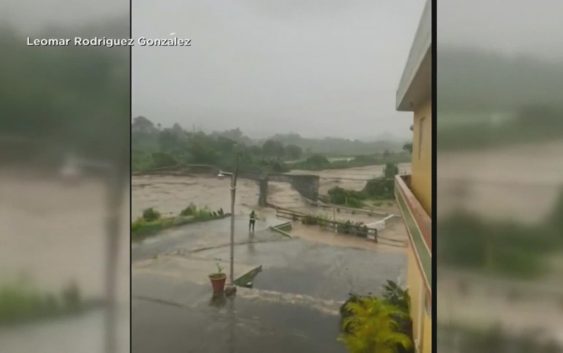- One set of evacuation orders lifted in Caldwell County after wildfire contained
- 'We gutted every building' | Chimney Rock rebuilding after Hurricane Helene
- 'We gutted every building' | Chimney Rock rebuilding after Hurricane Helene
- Debris from Hurricane Helene provides fuel, complicates containment for spring wildfires
- David & Nicole Tepper increase Hurricane Helene relief commitment to $750k
Hurricane Fiona decimates Puerto Rico farm with San Antonio ties

5000 Plantain Trees and 4,000 pounds of coffee were lost.
SAN ANTONIO — Just last week Hurricane Fiona hit the island of Puerto Rico, before making its way to Canada and though it has now dissipated, its effects are still being felt on the island.
Phone calls with Claudia Juarbe’s brother, Rafael, take a lot of planning.
“Sometimes we try to call them and because they don’t have power, electricity or internet, it’s super hard to talk to them and to check if they’re fine or not,” Claudia said, sitting on the outdoor patio of a far-west side Starbucks with her daughter, Alondra Acevedo, who agreed to be Rafael’s interpreter.
Fresh on all their minds are the memories of Hurricane Maria, which Rafael says had winds 10 times more intense than Fiona.
“It was stronger than Fiona,” Rafael said over the phone in Spanish. “We feared for our lives, but it wasn’t so much since we had lived through Maria.”
Rafael lives in Utuado. His farm is five miles away from the bridge the storm swept a down the Guaornica river.
“They were not expecting a lot of rain and it was a 26.5 inches,” Claudia said.
Also swept away, only by the wind were 5,000 plantain trees and 4,000 pounds of coffee as well as other crops used in their restaurant.
“When the power went out that basically that ruined all the stored food that was used for the restaurant all meats everything like that was gone bad,” Alondra said on Rafael’s behalf.
Rafael said it can be frustrating when hurricanes come through because they can be unpredictable.
“We’d never know what to expect, because magnitudes are very different,” Alondra said, interpreting.
“Continuar,” Claudia told Rafael over the phone, only to be met with digitized, garbled words.
A poor connection cut our conversation with Rafael short.
“This is part of the problem,” Claudia said, repeatedly trying to re-dial her brother.
But Claudia and her daughter Alondra did tell us that they are expecting some aid from FEMA. However, the time it takes to regrow crops is the real challenge.
“And then, you know, buy the seeds and do everything again in order to have the harvest,” Claudia said.
They said it’s difficult to watch the island go face these challenges from afar, but they know the resilience of the people will help them through.
“I think that just our people, our family, our friends are so strong, the only thing that they can do, and they know to do so keep their heads up high,” Alondra said.
They are directing anyone who would like to help the recovery effort to the non-profit Fundación Mochileando 100×35.